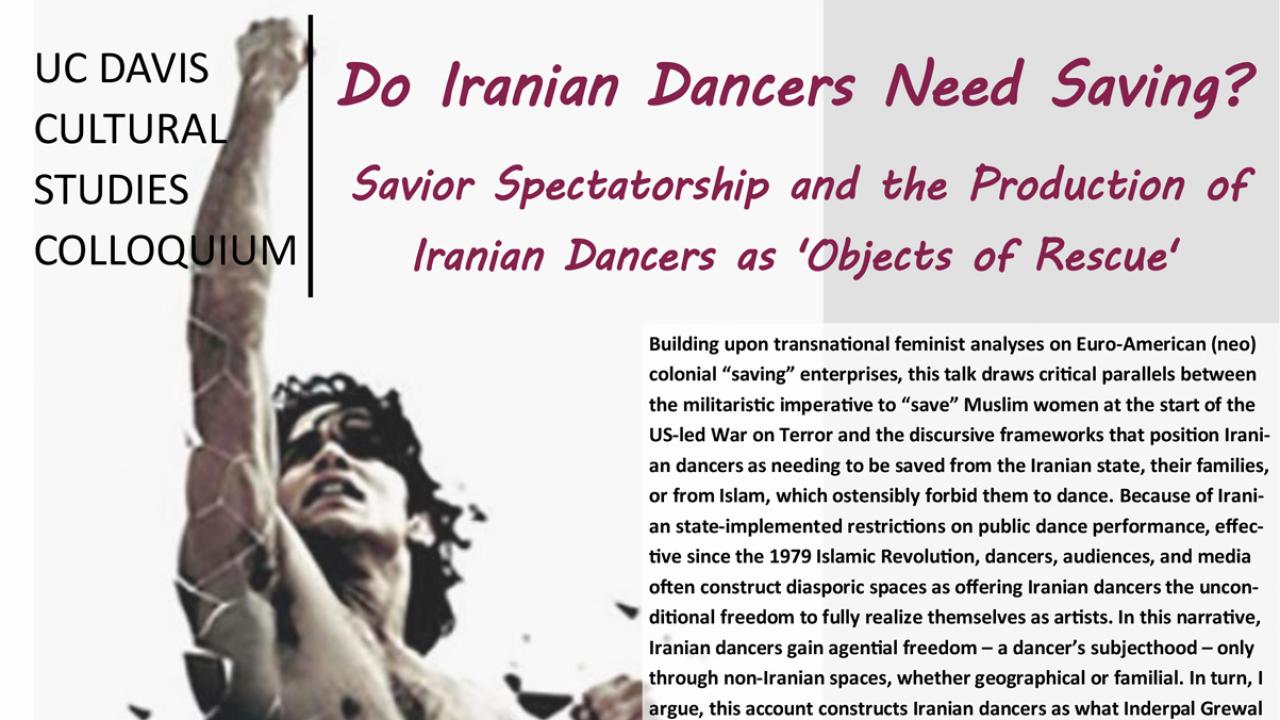
Event Date
Cultural Studies Graduate Group
Winter 2019 Colloquium Series
Do Iranian Dancers Need Saving?
Savior Spectatorship and the Production of Iranian Dancers as 'Objects of Rescue'
Talk by Dr. Heather Rastovac Akbarzadeh
Building upon transnational feminist analyses on Euro-American (neo)colonial “saving” enterprises, this talk draws critical parallels between the militaristic imperative to “save” Muslim women at the start of the US-led War on Terror and the discursive frameworks that position Iranian dancers as needing to be saved from the Iranian state, their families, or from Islam, which ostensibly forbid them to dance. Because of Irani-an state-implemented restrictions on public dance performance, effective since the 1979 Islamic Revolution, dancers, audiences, and media often construct diasporic spaces as offering Iranian dancers the unconditional freedom to fully realize themselves as artists. In this narrative, Iranian dancers gain agential freedom – a dancer’s subjecthood – only through non-Iranian spaces, whether geographical or familial. In turn, I argue, this account constructs Iranian dancers as what Inderpal Grewal calls “object of rescue.” I develop a theory of what I call savior spectatorship, a looking practice that operates within transmedia environments wherein discourses and images (static and moving) construct Iranian dancers as victims and their Euro-American and diasporic audiences as compassionate saviors. My case study focuses on Iranian dancer Afshin Ghaffarian, who emigrated from Iran to Paris in 2009. I trace how savior spectatorship is produced in the French reception of Ghaffarian's live performances and through the American-produced feature-length film Desert Dancer (2014), a sensationalized biographical drama portraying Ghaffarian’s life as an aspiring dancer in Iran and his defection to Paris. I argue that savior spectatorship and discourses of freedom surrounding Iranian dancers produce affects of empire that work to reinforce the image of Euro-American exceptionalism. I interrogate how dance becomes a form of “proof” of one’s humanity, which thus marks those who "oppress" dance as non-human, and ultimately (if even unintentionally) becomes dangerous currency within the global War on Terror. However, the dancer = human equation is a precarious one, for if an Iranian dancer becomes a “grievable life” (in Judith Butler’s terms), I argue that it is contingent only upon the purview to save.
 Heather Rastovac Akbarzadeh is a UC Chancellor’s Postdoctoral Fellow in UC Davis’s Department of Asian American Studies under the mentorship of Dr. Sunaina Maira. From 2016 – 2018, Heather was the Mellon Postdoctoral Fellow in Dance Studies at Stanford University. She earned her Ph.D. in Performance Studies from UC Berkeley with a Designated Emphasis in Women, Gender, and Sexuality. Heather’s research, which extends upon two decades as a dancer-choreographer among Iranian American communities, examines the lives and artistic works of diasporic Iranian dancers and performance artists residing in North America and Western Europe. Heather engages in ethnography, discourse analysis, and performance anal-ysis to investigate the racialized and gendered economies of Iranian performance in transna-tional art markets and among diasporic audiences.
Heather Rastovac Akbarzadeh is a UC Chancellor’s Postdoctoral Fellow in UC Davis’s Department of Asian American Studies under the mentorship of Dr. Sunaina Maira. From 2016 – 2018, Heather was the Mellon Postdoctoral Fellow in Dance Studies at Stanford University. She earned her Ph.D. in Performance Studies from UC Berkeley with a Designated Emphasis in Women, Gender, and Sexuality. Heather’s research, which extends upon two decades as a dancer-choreographer among Iranian American communities, examines the lives and artistic works of diasporic Iranian dancers and performance artists residing in North America and Western Europe. Heather engages in ethnography, discourse analysis, and performance anal-ysis to investigate the racialized and gendered economies of Iranian performance in transna-tional art markets and among diasporic audiences.